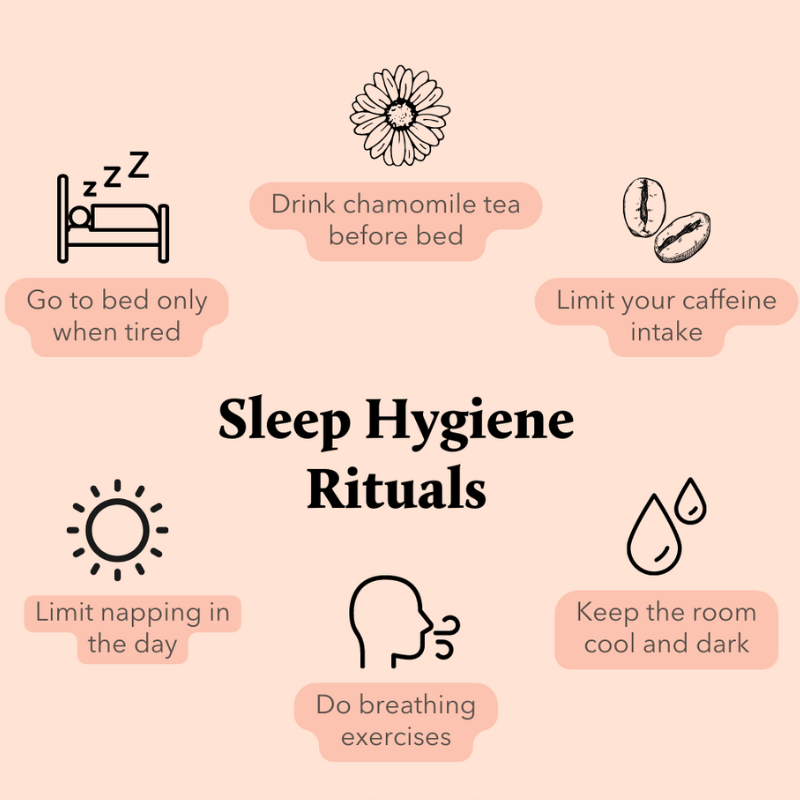Getting quality sleep isn’t just about going to bed early. The secret lies in developing an ideal bedtime routine for better sleep hygiene a series of intentional actions that help your body and mind unwind, signaling it’s time to rest. If you’re constantly waking up tired or having difficulty falling asleep, it’s time to upgrade your nighttime rituals. This guide explores practical, science-supported ways to create a bedtime routine that promotes deep, restorative sleep.
Why Sleep Hygiene Matters
Sleep hygiene refers to the daily habits and environment that influence the quality of your sleep. Poor sleep hygiene like late-night screen time, inconsistent bedtimes, or heavy meals before bed can interfere with your body’s natural circadian rhythm. Over time, this can lead to insomnia, fatigue, poor focus, irritability, and even long-term health issues.
Establishing an ideal bedtime routine for better sleep hygiene ensures your brain associates certain cues with rest, making it easier to fall asleep and stay asleep.
Start With a Consistent Sleep Schedule

The human body thrives on rhythm. Going to bed and waking up at the same time every day, even on weekends, helps regulate your internal clock. Try setting an alarm not just to wake up but also to remind you it’s time to start your nighttime routine.
Consistency is the foundation of an ideal bedtime routine for better sleep hygiene, as it reinforces your sleep-wake cycle and improves sleep efficiency over time.
Create a Technology-Free Zone
One of the biggest sleep disruptors is blue light from screens. Smartphones, tablets, and laptops emit light that interferes with melatonin production—the hormone that helps you fall asleep. Poor sleep can also weaken your immune system over time, making you more vulnerable to illness. Make your bedroom a no-screen zone at least 30–60 minutes before sleep. Use that time for calming activities like reading a book, meditating, or taking a warm bath.
Optimize Your Sleep Environment
A relaxing bedroom environment plays a major role in sleep hygiene. Here’s how to set the stage for better rest:
- Keep it cool: Ideal room temperature is between 18–22°C (65–72°F)
- Block out light: Use blackout curtains or a sleep mask
- Control noise: White noise machines or earplugs can help
- Use calming scents: Lavender or chamomile essential oils can promote relaxation
These environmental adjustments enhance your ideal bedtime routine for better sleep hygiene by reducing distractions and signaling your brain it’s time to sleep.
Wind Down With Relaxation Techniques
Stress is a major barrier to quality sleep. Incorporating relaxation exercises into your bedtime routine can ease your mind and body. Some effective techniques include:
- Deep breathing or diaphragmatic breathing
- Progressive muscle relaxation
- Mindfulness or guided meditation
- Gratitude journaling
Doing just 10 minutes of any of these can transition your mind from a high-alert state to one ready for rest.
Limit Stimulants and Late Meals
Avoid caffeine, nicotine, and heavy meals at least 3–4 hours before bed. These substances can keep your body alert, making it harder to sleep soundly. Instead, follow a calming yoga-inspired routine and opt for a light snack with ingredients that promote sleep, such as:
- A banana with almond butter
- Herbal teas like chamomile or valerian root
- A small bowl of oats with honey
These foods naturally support your ideal bedtime routine for better sleep hygiene by aiding in the production of serotonin and melatonin.
Gentle Movement Before Bed
Engaging in light stretching or yoga in the evening can gives you mindfulness and calm the nervous system. Unlike high-intensity workouts, which raise your cortisol and adrenaline levels, low-impact movement supports relaxation. Try a short yoga flow or a five-minute stretching session to ease into sleep mode.
Use Supplements Wisely
While lifestyle changes are key, certain natural supplements can support your sleep hygiene. Look for products that include ingredients like:
- Melatonin (regulates sleep cycles)
- Magnesium (relaxes muscles and nerves)
- L-Theanine (promotes calm without drowsiness)
- Valerian root (mild sedative properties)
Always consult your healthcare provider before starting any new supplements, especially if you’re taking medications or have a health condition.
Sample Ideal Bedtime Routine (60–90 Minutes Before Bed)
Here’s how a simple, effective nighttime ritual could look:
- 8:30 PM: Turn off screens and dim the lights
- 8:40 PM: Take a warm shower or bath
- 8:55 PM: Practice 10 minutes of deep breathing or journaling
- 9:10 PM: Sip on herbal tea and do some gentle stretching
- 9:30 PM: Read a book or meditate in bed
- 10:00 PM: Lights off and ready for sleep
Repeat this routine consistently, and you’ll begin to notice better sleep patterns within a few days.
Frequently Asked Questions
What is an ideal bedtime routine for better sleep hygiene?
An ideal bedtime routine includes consistent sleep timing, a screen-free wind-down period, calming activities like meditation or reading, a cool and dark environment, and avoiding stimulants. These habits cue your body to relax and prepare for restful sleep.
How long should my bedtime routine last?
Aim for 30 to 90 minutes. The key is consistency and choosing relaxing activities that signal your body it’s time to slow down and rest.
Can a bedtime routine really improve sleep?
Yes. Research shows that consistent pre-sleep routines help regulate the sleep-wake cycle, reduce insomnia, and improve overall sleep quality—especially when combined with good sleep hygiene.
Do children and adults need different bedtime routines?
The core principles are the same, but routines may differ by age. Adults might include meditation or reading, while children may need bath time, storytelling, and earlier bedtimes.
What should I avoid before bed to support sleep hygiene?
Avoid screens, caffeine, alcohol, heavy meals, and intense workouts at least a few hours before bed. These disrupt the body’s natural sleep signals.
Conclusion: Build Your Ideal Bedtime Routine Today
Crafting your ideal bedtime routine for better sleep hygiene doesn’t require a complete lifestyle overhaul—just small, mindful changes practiced consistently. By aligning your habits with your body’s natural rhythms, you can unlock better sleep, improved mood, sharper focus, and greater well-being.Looking for natural sleep support products and expert tips tailored to your wellness journey?
Visit us at MindScribes and take the first step toward a healthier night’s rest today.

